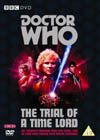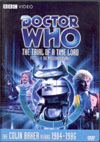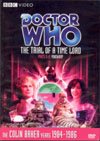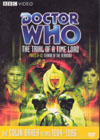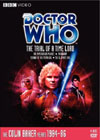Box Sets contain:
DVD Extras include:
Linking the stories of a particular season together has been done successfully before and since, with season 16's Key to Time arc setting the most famous precedent. It does, however, require a greater effort of leadership from the writers, and unbeknownst to the public at the time, tragedy and BBC politics struck the season hard here. Revered writer and former script editor Robert Holmes succumbed to his illness before he could complete his portions of the season's writing, and this extra strain appears to have been the straw that broke the camel's back for the relationship between then-current script editor Eric Saward and producer John Nathan-Turner. With the remaining writers both rushed and fearing to discuss plot with each other to avoid legal ramifications, it's no wonder some of the season's many questions and mysteries do not get satisfactorily answered and tied up in neat little bows. In itself, that isn't such a bad thing, and some elements of the season may work better by remaining unanswered, or at least not satisfactorily answered yet. But viewers were challenged, and many didn't like it. Missing one half-hour episode could leave them feeling lost for the rest of the season. Yes, some of the elements used this year didn't gel, and may have been better left out. But for those who stick it through with an inquiring mind, this remains one of the most intriguing and rich years of Doctor Who that John Nathan-Turner ever produced.
The Mysterious Planet (story no. 144)
The story's opening is nothing short of awesome, instantly grabbing attention with a brand new version of the theme tune, and flowing smoothly into an opening model shot that can easily put "Return of the Jedi" to shame. Seriously. Part One here is VERY smart to start off with just the characters we know, and only introduce new ones as they are encountered, allowing the cast list to grow at the rate at which the audience can appreciate them.
Prime Redundancy?The main subject of this trial may easily seem redundant to both long-term viewers as well as those familiar with the modern show. The Time Lords of the Doctor's home planet of Gallifrey seem to subscribe to something very similar to the Federation's Prime Directive on Star Trek, BUT, unlike Captains Kirk, Picard, or any of the other lead characters in the shows of that franchise, the Doctor has never made any claim to either believe in or follow such an edict. In adventure after adventure, he espouses the role of hero, and jumps straight into it. What few exceptions there have been over the last 140 odd televised stories are usually disappointments, unworthy of the attention of the cameras used to capture them.All this raises an important question for "The Trial of a Time Lord". If the Doctor is NOT going to contest the fact that he interferes, and neither does he challenge the non-interference policy itself, what really is there left for the court to decide? Have the Time Lords and the Doctor not already come to the conclusion that they must disagree on this point? Most curiously though, the Doctor isn't really pressured to enter a plea on the non-interference charges before the evidence begins. All of this somewhat validates Jonathan Powell's criticisms of the clarity of what the characters are actually attempting to prove or disprove with their evidence. In actual fact, the trial does manage some decent arguments above the usual entrappings of Star Trek's Prime Directive. Thankfully, there are no pretentious notions of what any other society's "natural development" should or should not be. Instead, this trial manages to focus quite nicely on whether one person's influence is helpful or detrimental, and also whether it is wanted or unsolicited. Excellent criteria. But a bit at odds with what Time Lords are supposedly looking for. All of which keeps open the question of what is REALLY going on here, politically, behind the scenes.....
And More Character on Ravalox...The more immediate adventure starts out by expertly establishing the mysterious planet Ravalox and sticks with just the Doctor and Peri for a while, which is a nice move. Refreshingly, their relationship seems to have matured drastically. Instead of the constant irritable barbs, it actually appears that they have developed an endearing rapport with each other since we last saw them. I particularly enjoy the scene with the very moving "Nothing can be eternal" speech, which is enhanced by one of the story's most emotional musical cues. All good.Glitz and Dibber are introduced next, and although they're technically not meeting the Doctor and Peri yet, they are clearly establishing a geographical relationship and a tactical assumption. In fact, Glitz's little mission briefing recap here nicely triggers intrigue as to what the Doctor and the audience may yet discover on the planet..... And the story soon splits between these two duos, only adding more cast members as the two duos encounter them. Glitz is definitely more interesting than most of the other mercenaries that script editor Eric Saward loved to include during his reign on the show. Mostly we can put that down to his "lovable rogue" charm. He does seem more hard-nosed here in his debut episode, but I think we should note that it's his dialogue that is giving that impression. Watch carefully what he actually DOES... and in the end you have to wonder if he isn't trying to put on a bit of an act in front of Dibber to make himself look tough and maintain a weird sort of morale amongst criminals. One of the highlights amongst the casting is having Queen Katryca played by Joan Sims, one of the regular stars of the popular "Carry On..." series of comedy feature films. Sims works well to create a strong, commanding presence for Katryca in early episodes, but sadly the writing encourages more melodramatic shenanigans as it later decays.... Tom Chadbon's character Merdeen isn't bad and remains watchable, but is far from a tour-de-force performance. One is left feeling that there should have been much more going on with this character, and somehow it just never happened. Perhaps part of the problem is that his society is just never fleshed out all that believably. Drathro, the "Immortal" L-3 robot is one of the tale's more successful creations, and his design is probably one area where more money proved beneficial. A very solid look is made very dexterous and expressive, and combined with good vocal work, the robot can hold his own while acting with Britain's finest.... when he gets Britain's finest like Colin Baker, Tony Selby, or Tom Chadbon to act opposite. In an inexplicable repeat of Holmes' first Doctor Who script "The Krotons" (story no. 47), Drathro makes a habit of recruiting the two "brightest" locals to help him inside his lair, only this time it's a cinematic disaster. Like the previous duo that Avon finds in the Blake's 7 episode "Orbit" which Robert Holmes also wrote, they can make you wonder why you're still watching, but at least the duo from "Orbit" begins to work after a few minutes. Here, Humker and Tandrell, or whatever their names are, become the poster-boys for the story's excesses of irritability. Ideally the show should lose as much excess footage of these two as possible. Particularly during Part Three, it seems that for every two lines of dialogue they have that are critical to the plot, there are another ten begging to hit the cutting room floor along with Drathro's irritated reaction towards them. The scripts for Parts Two to Four also seem to be grasping at straws to find excuses to return to the Trial room at regular intervals and remind viewers of the larger stakes for the season. Sometimes, we get a really good scene, at other times we get nothing but a lot of obvious fluff. The writers should free themselves from the compulsion to fill time and pad the script with dialogue. Instead take a lesson from the nearly equally long "The Dalek Masterplan" (story no. 21), whose fifth episode in particular shows a good example of a script that was left lean, while director Douglas Camfield and musician Tristram Cary filled in lots of space with purely cinematic, atmospheric shots and sequences. However, excusing the padding, the scenes we still need to move the story forward are fairly well done. Particularly on first viewing, I had come to expect a slow pace from Holmes, and was pleasantly surprised when things picked up half-way through the second episode and the plot kept on rolling, minor padding aside, throughout the later episodes and right through to the finish. The L1 robot is a more successful prop than ones used for similar ideas in this show's past, making for some fairly decent location action sequences. Things could have gone up yet another notch had decent lasers been superimposed in for this story, but what we get here isn't too bad. The comments of then BBC Head of Drama Jonathan Powell (available as part of the DVD's pop-up production notes), particularly in combination with Eric Saward's rebuttals on his solo audio commentary track, are quite interesting, and in many ways foreshadowed reactions of fans and audiences towards the finished product. Keeping in mind that Powell was commenting on a prior version of the story, I think most of his comments are valid and, in the end, constructive. What comments of his they took on board undoubtedly strengthened the tale, particularly in clarifying the opening. I will disagree vehemently with his opinion of Glitz and Dibber, who continue to be a large part of the draw of this story, and Saward's clueless attempts to defend them show that he has fallen hook, line, and sinker into one of Powell's misconceptions about them. But, due to potential spoilers, I'll save that discussion for the in-depth analysis review of "The Mysterious Planet". Here Colin Baker finally gets good characterization of the heroic archetype that has led this show to triumph and last as long as it has. Indeed, the Doctor is far better occupied here than in "The Caves of Androzani" (story no. 136) (not too difficult to accomplish), and remains busier and a bit more on the ball than in "The Two Doctors" (story no. 141). Sadly, I will have to give the writers a failing grade in astronomy, as they contradict themselves with their details, don't quite do what they seem to need to do for story purposes, and indeed don't seem to have a clue where anything is in the heavens. For 1986 writing, the audience deserves better. Of course, we can't leave off without mentioning this story's fabulous musical score by newcomer Dominic Glynn, who easily sets the definitive memorable musical tone for the season here. So many important themes are first defined here.... The score maintains a basic moodiness very appropriate to the trial, and it is very hard to find anything truly objectionable anywhere in it, unlike some of the work in previous years. Very nicely done.
Mindwarp (story no. 145)
The cast of characters is fairly strong though, and as more and more of them come into play, the story becomes more and more interesting. Sil is back, and unlike in "Vengeance on Varos" (story no. 139), he actually gets a lot of fun, good quality interaction with Colin Baker's Doctor. Nabil Shaban gives another highly entertaining performance, and is one of the story's biggest and most memorable draws. Other members of Sil's race are present as well. Christopher Ryan brings a very nice character to life as Lord Kiv, Sil's slightly eccentric boss. Of course, Brian Blessed's larger than life portrayal of the warlord King Yrcanos threatens to steal the show, but doesn't quite because the rest of the cast is still strong, and Blessed supports and works well with them. But you can expect fantastic energy and unusually surprising choices with the delivery of nearly every one of his lines. Some may question its believability, but its entertainment value is certainly high. In many ways, the appeal is very similar to that of the modern Klingon - the honourable, culturally mysterious, enthusiastic warrior - and Yrcanos comes before Klingons had re-invented themselves in favour of this cult appeal in the Star Trek spinoff series. Sadly the action for this story is a bit of a letdown. Yrcanos is often in the middle of it, but what's really lacking is careful blocking, and the freedom of single camera work. And of course decent laser beams. The demonstration of this story's most prolific weapon in Part Five works, thanks to a degree of care that they couldn't hope to repeat during the later battles. But really, some good superimposed lasers could have brought the story's action up another notch. Surprisingly, this story actually gives Peri a lot to do all the way through. In fact, I don't think Nicola Bryant has been this well-served by a script since her introduction in "Planet of Fire" (story no. 135). There is a real sense of her becoming the audience's touchstone character here, and carrying a good chunk of the main narrative. Peri gets a lot of nice, emotional moments throughout this story. Colin Baker's Doctor also gets to run the gamut of emotions throughout this adventure, from the solid and traditional to the questionable. While this may echo prior themes from "The Twin Dilemma" (story no. 137), it is far better motivated and more palatable here. Perhaps in part thanks to this story's ability to allow Colin to react to his own behaviour via the trial, it remains easy to continue to root for him all the way through this one, and it helps "Mindwarp" become one of the important stories of his era as well. In many ways, I think these segments of the trial have helped shape Doctor Who criticism in the years since it was first shown, and helped audiences and writers focus a little better on the actions of the main character of the show, as we wonder what other adventures might be equally fair game for the debate that ensues here. Are his values hypocritical? Does his interference manage to be helpful? Does he do more harm than good? Do others pay too high a price for his heroics? All this "Mindwarp" tackles, to the show's ultimate benefit I think. Very good stuff indeed. Richard Hartley provides a superbly tasteful musical score for the story which works in every scene, and one that appears to be quite minimal and rarely calling attention to itself. While opening sections paint a very otherworldly musical backdrop for the story's alien location to go along with the visuals, the score's most memorable bits are saved for the final episode.... Part Eight is one of the grandest achievements of Colin Baker's era. No spoilers here, you'll have to tune in and watch this one.
Terror of the Vervoids (story no. 146)
Although Colin Baker's Doctor will get plenty of good scenes and good stuff to do before the adventure is over, his early material seems a bit disappointing. He often seems to get a bit too moody in the beginning, and with there being something just out of sync between him and his unintroduced new companion, it takes a while for him to get on form. But he gets better and better stuff to do as the story progresses, and eventually he becomes very good in this one. The biggest character disappointment is the cheeseball fashion in which the Doctor's new traveling companion Melanie is thrust upon the viewer. Even after accepting that she has no proper introduction, and that she is meant to treat this adventure as just another outing with the Doctor, this story also manages to gives us a very artificial rapport between the two. While most other characters get their due later in the story, the viewer remains at a bit of a loss as to why the Doctor and Mel are together, who Melanie is, or what she is really all about.
The Resequencing of Christmas PastSome of the biggest continuity problems of the season involve the sequence in which both the Doctor and Melanie experience this adventure as opposed to the next one. Since the alarm bells only go off at the end of the next story, there has been a tendency to give it the blame.I suggest both the blame and the best fixes lie in "Terror of the Vervoids". It was a novel idea to include some evidence from the Doctor's future, but it just doesn't work here. Concepts of future evidence and preventative prosecution before the actual crime are dealt with better in the Steven Spielberg film "Minority Report", which took a good crack at examining the issue from several angles. "Vervoids" on the other hand would prefer to handle the case as a traditional done deal, and ignores all the ramifications of setting the adventure in the Doctor's future after the trial.... all except using this as an excuse to cop out of properly introducing Melanie. Though I'll save the details of my reasons for the in-depth analysis version of my review for "Terror of the Vervoids", the bottom line is that "Vervoids" belongs in the Doctor's past. In my mind, it happened sometime between his experience of "The Mysterious Planet" and his experience of "Mindwarp". This ultimately solves far more problems that it creates, and what few problems remain can be neatly cleaned up with judicious editing.
Mystery on the Hyperion ExpressIt must be noted that the story is a good television equivalent of a page-turner. The characters may not grab, but the multi-layered mystery does hold attention and fascinate quite well, while unknowns about a monster force new for Doctor Who mount as well. Eye-candy is also exceptionally high, from the design esthetic of the ship interior (even though certain elements like telephones and earphones are now much more dated than they were then), to some very well-produced model work for the ship exteriors, to all the computer graphic video effects by Danny Popkin seen throughout.Part Eleven contains two serious disappointments though. One is the "square" look of the black hole visual, as it has too obviously been clumsily matted into the rest of each shot. Too bad it didn't get put in by one of the round soft-edged picture-in-picture mixes that Dave Chapman enjoyed using so profusely. A bigger disappointment was the revelation of the Vervoids themselves. With one notable exception, they are not a great design or look. Ultimately, the Vervoids get upstaged a little too completely by the need to resolve all the mysteries, and will not get ranked too favourably as antagonistic forces in Doctor Who's long history. But it isn't hard to accept these two minor shortcomings and get absorbed in the tale. Director Chris Clough impresses as the most visually creative director we've had this year, and does so while staying on story and keeping the audience involved in the adventure. Good stuff. The story's music is handled by veteran Malcolm Clarke, who turns in another solid score, although far from his most definitive one. Sadly, the DVD's Photo Gallery music montage emphasizes the very cheesiest bits of his score as it opens and closes, and leaves out my favourite cue. Clarke's most definitive piece for this story is the penultimate cue of episode 10. Right here, where the Vervoids are mostly musical, this is where the Vervoids succeed best, and are at their height of creepiness.
The Ultimate Foe (story no. 147)
Much of the early dialogue displays unnecessary irritability, but intermixed with this, one will find some all time classic sound bites, and more satisfying revelations than anywhere else in the rest of the trial. After satisfyingly exhausting most of the remaining possibilities for the old familiar trial room, the story expands its settings into the Matrix of Gallifrey, which has been at the center of much of the trial's controversy. Apart from a few "phone calls" during "Arc of Infinity" (story no. 124), this is the first time we've gone inside the Matrix for serious story development since it was introduced in "The Deadly Assassin" (story no. 88), and this is a much deserved and long-awaited second outing for it. The episode does manage to feel padded for about 2 or 3 minutes, as it focuses on richness of character at the expense of plot and pace. If you are ever going to pad out a script, the example here is probably the most classic way of making it obvious. It's a familiar Holmes theme, raging against the establishment, but it does feel a bit out of place here, after all we've been through and considering what's at stake. Still, it's an easily forgivable interlude.
There are many more details of this final episode to examine, but to avoid potential spoilers here, we'll save all that for the in-depth analysis version of our review of "The Ultimate Foe". Come back and read it after you've enjoyed viewing the entire "Trial" season yourself. Although no one knew it at the time, and certainly didn't plan for it in any way, this turned out to be Colin Baker's last story. He is exceptionally good in this one, and has a great cast surrounding him here. The story also manages to have a great sequence that builds an atmosphere perfect for any Doctor's finale. Like Patrick Troughton before him, Colin has saved his best story for last, and had many very similar elements in it as well. Musically, I think it was the best choice to bring Dominic Glynn back for these final two episodes, and conclude the season in the same style as it began. Glynn is able to reuse many of his previous themes, and comes up with some very nice music for the surreal Matrix that combines nebulous dread with spooky playfulness, nicely nailing the correct tone for the story. Although, his work for "The Mysterious Planet" opening segments was a bit more original and striking, this is a close second amongst the season's music.
The entire season has also been better on the whole than Colin's previous one, getting story structure back on its natural form and paying much better attention to the Doctor's actions in each adventure. In fact, season 23 doesn't really have a "dud" story worthy of the Wooden Turkey Award, which is rare for seasons 21 and beyond. In the end, "The Trial of a Time Lord" is one of the imperfect gems of the show, and should become a proud addition to the collection of any serious Doctor Who fan.
International Titles:Deutsch: "Das Urteil"Magyar: "Egy Idő Lord tárgyalása"Русский: "Суд над Повелителем времени"
Rankings for Season 23 - The Trial of a Time Lord:
These stories are available on DVD and VHS video in the Trial of a Time Lord full season box set for season 23. Click on the Amazon symbol for the location nearest you for pricing and availability:
Comments on this article are welcome. You may contact the author from this page:
|

